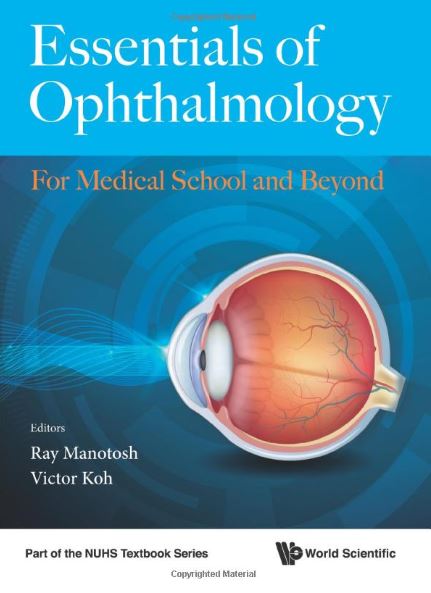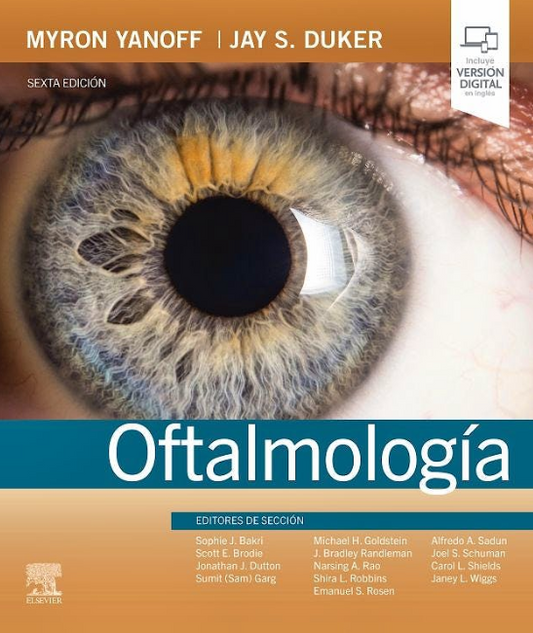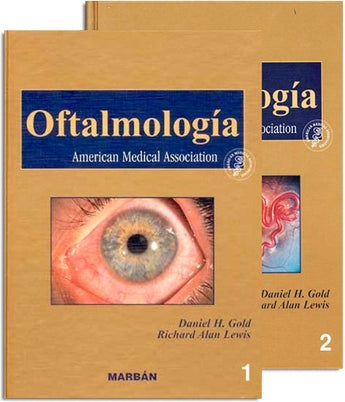Cornea. Fundamentals, Diagnosis and Management 2 vols.
- 501.89 €
528,31 €- 501.89 €
- (-5%)
- Precio unitario
- / por
IVA Incluido. Envío gratis Península/Baleares (Ver P.E.).
ISBN: 9780323672405
Editorial: Elsevier
Autor: MANNIS
Edición: 5ª - 2021
Idioma: Español
Impresión: Color
Páginas: 1976
Formato:
Alto: 28 cm
Ancho: 22 cm
Encuadernación: Tapa Dura
"Entrega en un plazo de 10 a 15 días hábiles"
The only reference available that synthesizes this vast subspecialty into a single trustworthy resource Cornea 5th Edition provides state-of-the-art coverage of the expanding range of contemporary corneal surgery new diagnostic and imaging technologies and medical management of corneal and external disease as well as ocular surface disease. Drs. Mark J. Mannis Edward J. Holland and a team of more than 200 global experts keep you up to date with both common and more obscure diseases and disorders and the best route to effective treatment and management making this two-volume text a must-have resource for residents and fellows general ophthalmologists and seasoned cornea specialists.
- Features more than 2,300 exceptionally clear illustrations, diagnostic images, and step-by-step surgical photographs that offer superb visual guidance.
- Contains 14 new chapters, including Nanothin DSAEK, Aqueous Deficiency Dry Eye Syndrome, Evaluation of Recurrent Corneal Erosions, Evaluation of the Corneal Ulcer, Contemporary Approaches to the Biosynthetic Cornea, and Topography Guided Photorefractive Keratectomy, and more.
- Includes more than 80 video clips of current corneal surgery techniques, including new clips of the application of amniotic membrane penetrating keratoplasty, Descemet rupture management in DALK, and endothelial keratoplasty among others.
- Covers the latest developments in ocular surface transplantation, including new chapters on Conjunctival Limbal Autograft (CLAU); Living Related Conjunctival Limbal Allograft (Lr-CLAL); Keratolimbal Allograft; Cultivated Limbal Epithelial Transplantation; Simple Limbal Epithelial Transplantation; and Outcomes of Ocular Surface Transplantation.
- Provides key point overviews in each chapter that offer easier access to crucial information.
CONTENTS:
Volume I: Fundamentals, Diagnosis and Management
Part I: Basic Science: Cornea, Sclera, Ocular Adnexa Anatomy, Physiology and Pathophysiologic Responses
1. Cornea and Sclera: Anatomy and Physiology
2. The Conjunctiva: Anatomy and Physiology
3. Tear Film
4. Eyelids and the Corneal Surface
5. A Matrix of Pathologic Responses in the Cornea
Part II: Examining and Imaging the Cornea and External Eye
Section 1: Basic Evaluation of the Cornea and External Eye
6. Examination of the Lids
7. Slit Lamp Examination and Photography
8. Tear Film and Corneal Diagnostic Techniques
Section 2: Laboratory Investigations
9. Practical Ophthalmic Microbiology for the Detection of Corneal Pathogens
10. Molecular Genetics of Corneal Diseases
Section 3: Imaging Techniques of the Cornea
11. Keratometry and Topography
12. Corneal Shape Analysis and Biomechanical Assessment
13. Specular Microscopy
14. Confocal Microscopy
15. Clinical Applications of Confocal Microscopy
16. High Resolution Ultrasound
17. Anterior Segment Optical Coherence Tomography
Part III: Differential Diagnosis of Selected Problems in Cornea and External Eye Disease
18. Congenital Corneal Opacities: Diagnosis and Management
19. Peripheral Corneal Disease
20. Evaluation of the Corneal Ulcer
21. Evaluation of Recurrent Corneal Erosions
22. Corneal Deposits
23. The Red Eye
Part IV: Eye Banking
24. Eye Banking: Structure and Function
25. Medical Standards for Eye Banking
Part V: The Ocular Adnexa
Section 1: Diseases of the Lid: Anatomic Abnormalities
26. Malposition of the Eyelids
Section 2: Diseases of the Lid: Tumors, Inflammation and Infection
27. Benign Lid Tumors
28. Malignant Eyelid Tumors
29. Blepharitis: Overview and Classification
30. Eyelid Infections
Section 3: Disorders of Tear Production and the Lacrimal System
31. Dry Eye Overview: Classification and Treatment Algorithm
32. Aqueous Deficiency Dry Eye Syndrome
33. Meibomian Gland Dysfunction and Evaporative Dry Eye
34. Dacryoadenitis, Dacryocystitis, and Canaliculitis
35. Epiphora
Part VI: The Conjunctiva
Section 1: Conjunctivitis
36. Conjunctivitis: An Overview and Classification
37. Bacterial Conjunctivitis
38. Viral Conjunctivitis
39. Chlamydial Infections
40. Ophthalmia Neonatorum
41. Parinaud Oculoglandular Syndrome
42. Seasonal and Perennial Allergic Conjunctivitis
43. Vernal and Atopic Keratoconjunctivitis
44. Giant Papillary Conjunctivitis
45. Mucous Membrane Pemphigoid
46. Erythema Multiforme, Stevens-Johnson Syndrome, and Toxic Epidermal Necrolysis
47. Toxic Conjunctivitis
48. Superior Limbic Keratoconjunctivitis
49. Ligneous Conjunctivitis
50. Conjunctivochalasis
Section 2: Conjunctival Tumors
51. Epithelial Tumors of the Conjunctiva
52. Medical and Surgical Management of Ocular Surface Squamous Neoplasia
53. Melanocytic Neoplasms of the Conjunctiva
54. Subepithelial Tumors of the Conjunctiva
Part VII: Diseases of the Cornea
Section 1: Developmental Abnormalities of Cornea
55. Developmental Corneal Anomalies of Size and Shape
56. Axenfeld-Rieger Syndrome
57. Peters Anomaly
Section 2: Corneal Manifestations of Systemic Disease and Therapies
58. Corneal Manifestations of Metabolic Diseases
59. Skeletal and Connective Tissue Disorders with Anterior Segment Manifestations
60. Granulomatosis with Polyangiitis and Other Systemic Inflammatory Diseases
61. Nutritional Disorders
62. Hematologic Diseases and Malignancies
63. Endocrine Disease and the Cornea
64. Dermatologic Disorders and the Cornea
65. Infectious Disease: Ocular Manifestations
66. Corneal and External Ocular Infections in Acquired Immunodeficiency Syndrome (AIDS)
67. Ocular Graft-versus-Host Disease
68. Corneal Manifestations of Local and Systemic Therapies
Section 3: Corneal Dystrophies, Ectatic Disorders, and Degenerations
69. Corneal Dystrophy Classification
70. Anterior Corneal Dystrophies
71. The Stromal Dystrophies
72. Descemet Membrane and Endothelial Dystrophies
73. Noninflammatory Ectatic Disorders
74. Iridocorneal Endothelial Syndrome
75. Corneal and Conjunctival Degenerations
Section 4: Corneal Infections
76. Bacterial Keratitis
77. Nontuberculous Mycobacteria Keratitis
78. Herpes Simplex Keratitis
79. Herpes Zoster Keratitis
80. Less Common Viral Corneal Infections
81. Fungal Keratitis
82. Acanthamoeba and Other Parasitic Corneal Infections
83. Corneal Diseases in the Developing World
Section 5: Interstitial Keratitis
84. Syphilitic Keratitis
85. Nonsyphilitic Interstitial Keratitis
Section 6: Noninfectious Keratopathy
86. Filamentary Keratitis
87. Superficial Punctate Keratitis of Thygeson
88. Neurotrophic Keratitis
89. Factitious Keratoconjunctivitis
Section 7: Immunologic Disorders of the Cornea
90. Corneal Disease in Rheumatoid Arthritis
91. Corneal Disease Associated with Nonrheumatoid Collagen-Vascular Disease
92. Phlyctenular Keratoconjunctivitis and Marginal Staphylococcal Keratitis
93. Mooren Ulcer
Section 8: Corneal Trauma
94. Mechanical Injury
95. Chemical and Thermal Injuries of the Eye
96. Corneal Complications of Intraocular Surgery
97. External Eye Manifestations of Biological and Chemical Warfare
Section 9: Contact Lenses
98. Contact Lens Applications in Corneal Disease
99. Complications of Contact Lens Wear
Part VIII: The Sclera and Anterior Uvea
Section 1: Disorders of the Sclera
100. Episcleritis
101. Scleritis
102. Classification and Diagnosis of Anterior Uveitis
103. Idiopathic Anterior Uveitis
104. HLA-B27-Related Uveitis
105. Sarcoidosis
106. Behcet's Disease
107. Fuchs Uveitis Syndrome
108. Juvenile Idiopathic Arthritis-Associated Uveitis
Volume II: Surgery of the Cornea and Conjunctiva
Part IX: Keratoplasty
Section 1: Overview
109. The Evolution of Contemporary Keratoplasty
110. Preoperative Considerations and Decision-Making in Keratoplasty
Section 2: Penetrating Keratoplasty Procedures
111. Penetrating Keratoplasty: The Fundamentals
112. Intraoperative Complications of Penetrating Keratoplasty
113. Femtosecond Assisted Penetrating Keratoplasty
Section 3: Penetrating Keratoplasty: Postoperative Management
114. Postoperative Management
115. Diagnosis and Management of Corneal Allograft Rejection
116. Infections after Penetrating Keratoplasty
117. Glaucoma after Corneal Transplantation
Section 4: Anterior Lamellar Keratoplasty
118. Indications for Anterior Lamellar Keratoplasty
119. Historical Development of Anterior Lamellar Keratoplasty
120. Techniques of Anterior Lamellar Keratoplasty
121. Intraoperative and Postoperative Complications of Anterior Lamellar Keratoplasty
122. Recovery Techniques in DALK
123. Outcomes of Anterior Lamellar Keratoplasty
Section 5: Complex Keratoplasty
124. Pediatric Keratoplasty
125. Keratoplasty in Herpes Simplex Disease
126. Immunologically High-Risk Penetrating Keratoplasty and Large-Diameter Corneal Grafts
Section 6: Endothelial Keratoplasty
127. Historical Development of Endothelial Keratoplasty
128. Indications and Decision Making for Endothelial Keratoplasty
129. Eye Bank Preparation of Tissue for Endothelial Keratoplasty
130. Surgical Techniques for DSAEK
131. Ultrathin DSAEK
132. Nanothin DSAEK
133. Intraoperative and Postoperative Complications of DSAEK
134. Outcomes of DSAEK
135. Surgical Technique for DMEK
136. Intraoperative and Postoperative Complications of DMEK
137. Outcomes of DMEK
138. Complex Endothelial Keratoplasty
139. Cultivated Corneal Endothelial Cell Transplantation
Part X: Therapeutic Procedures
Section 1: Corneal Surgery
140. Management of Corneal Perforations
141. Therapeutic Keratoplasty
142. Surgical Management of Superficial Corneal and Conjunctival Disease
143. Excimer Laser Phototherapeutic Keratectomy
Section 2: Conjunctival Surgery
144. Management of Primary Pterygium
145. Management of Recurrent Pterygium
146. Conjunctival Flaps
147. Indications for and Uses of Amniotic Membrane: Clinic
148. Indications for and Uses of Amniotic Membrane: Operating Room
Section 3: Anterior Segment Surgery
149. Surgical Management and Rehabilitation of Anterior Segment Trauma
150. Iris Reconstruction Surgery
151. Management of Scleral Perforation
Part XI: Collagen Crosslinking
152. Collagen Crosslinking for Keratoconus
153. Collagen Crosslinking for Post-Refractive Ectasia
154. Collagen Crosslinking for Infectious Keratitis
Part XII: Keratoprosthesis
155. Indications for Keratoprosthesis
156. Boston Keratoprosthesis Type 1 Surgical Technique
157. Postoperative Management of Boston Keratoprosthesis Type 1
158. Complications of Boston Keratoprosthesis Type 1
159. Outcomes of Boston Keratoprosthesis Type 1
160. Boston Keratoprosthesis Type 2 Surgical Techniques, Complications, and Outcomes
161. OOKP
162. Contemporary Approaches to the Biosynthetic Cornea: Overview and Classification
Part XIII: Ocular Surface Transplantation
163. Classi?cation and Staging of Severe Ocular Surface Disease
164. Conjunctival Limbal Autograft (CLAU)
165. Living Related Conjunctival Limbal Allograft (lr-CLAL)
166. Keratolimbal Allograft
167. Cultivated Limbal Epithelial Transplantation
168. Simple Limbal Epithelial Transplantation
169. Postoperative Management of Ocular Surface Reconstruction
170. Corneal Transplantation in Ocular Surface Disease
171. Outcomes of Ocular Surface Transplantation
Part XIV: Refractive Surgery
Section 1: Preoperative Considerations
172. Decision Making in Refractive Surgery
173. Patient Evaluation and Selection in Refractive Surgery
174. Topographic Analysis in Keratorefractive Surgery
Section 2: Laser Vision Correction
175. Excimer Laser Surface Treatment: Photorefractive Keratectomy
176. LASIK Technique
177. LASIK for Myopia
178. LASIK for Hyperopia
179. LASIK complications
180. Corneal ectasia: prevention, detection, and management
181. Small Incision Lenticule Extraction
Section 3: Additional Refractive Procedures
182. Topography Guided Photorefractive Keratectomy
183. Intrastromal Corneal Ring Segments
184. Combined Corneal Refractive Techniques
185. Incisional Keratotomy
186. Phakic Intraocular Lenses
187. Corneal Inlay Surgery for Presbyopia: Techniques and Complications
Relacionados
- 29.45 €
31,00 €- 29.45 €
- (-5%)
- Precio unitario
- / por
- 261.25 €
275,00 €- 261.25 €
- (-5%)
- Precio unitario
- / por
- 66.50 €
70,00 €- 66.50 €
- (-5%)
- Precio unitario
- / por
Visto recientemente
- 501.89 €
528,31 €- 501.89 €
- (-5%)
- Precio unitario
- / por
- 501.89 €
528,31 €- 501.89 €
- (-5%)
- Precio unitario
- / por
- 501.89 €
528,31 €- 501.89 €
- (-5%)
- Precio unitario
- / por
- 501.89 €
528,31 €- 501.89 €
- (-5%)
- Precio unitario
- / por
- 501.89 €
528,31 €- 501.89 €
- (-5%)
- Precio unitario
- / por
- 501.89 €
528,31 €- 501.89 €
- (-5%)
- Precio unitario
- / por
- 501.89 €
528,31 €- 501.89 €
- (-5%)
- Precio unitario
- / por
- 501.89 €
528,31 €- 501.89 €
- (-5%)
- Precio unitario
- / por
- 501.89 €
528,31 €- 501.89 €
- (-5%)
- Precio unitario
- / por
- 501.89 €
528,31 €- 501.89 €
- (-5%)
- Precio unitario
- / por
- Elegir una selección resultará en una recarga completa de la página.







